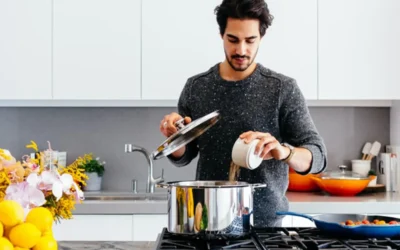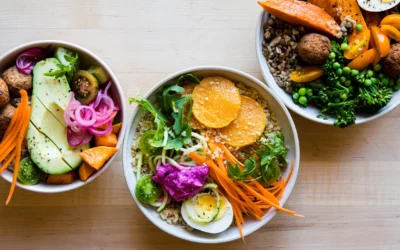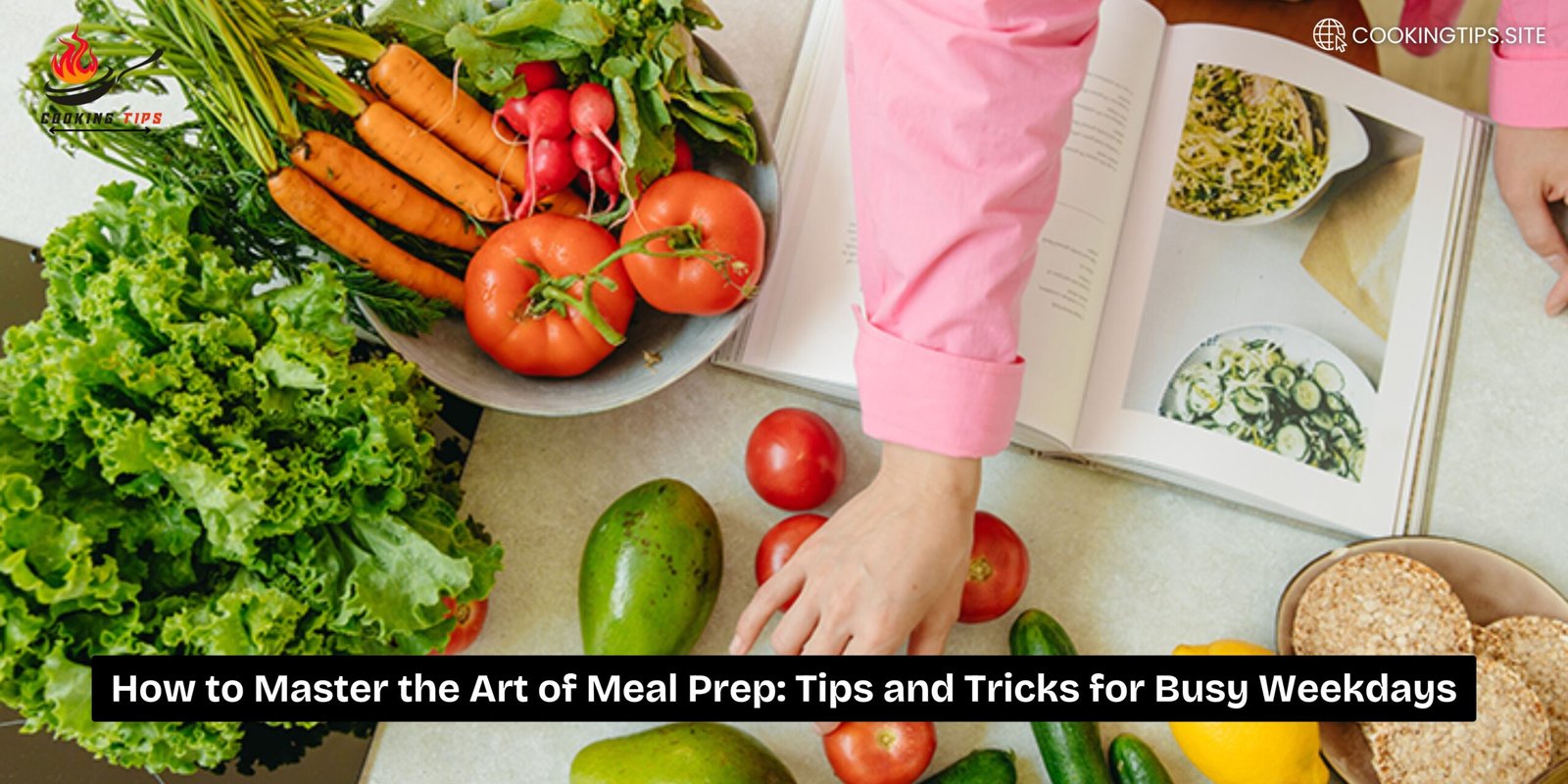In today’s fast-paced world, finding the time to cook healthy meals can be a challenge, especially on busy weekdays. Meal prepping is a game-changer, offering a simple solution to help you save time, reduce stress, and eat healthier throughout the week. By preparing your meals in advance, you can ensure that you always have something nutritious and satisfying ready to go when hunger strikes.
If you’re new to meal prepping or looking to refine your technique, these tips and tricks will help you master the art of meal prep and make your weekdays easier, healthier, and more organized.
1. Start with a Plan
The key to successful meal prep is having a solid plan. Spend some time each week deciding on the meals you want to prepare. This doesn’t have to be a complex or time-consuming process; simply decide on a few core dishes that you can rotate throughout the week.
- What to Plan: Think about breakfasts, lunches, dinners, and snacks. Focus on recipes that use similar ingredients to minimize waste and make the prep process faster.
- Why It’s Essential: A plan helps you stay organized and ensures that you’re prepping with purpose. It also allows you to create a shopping list so you can buy everything you need in one trip.
2. Batch Cook Staples
The foundation of most meal prep routines involves batch cooking staple ingredients that can be used in multiple dishes. This makes it easier to throw together quick meals when you’re short on time.
- What to Batch Cook: Cook large batches of grains (like rice, quinoa, or pasta), proteins (such as chicken, tofu, or beans), and vegetables. Store them in separate containers, and use them throughout the week in various combinations.
- Why It’s Essential: Cooking in bulk saves time, and batch cooking staples allows you to mix and match different components to create a variety of meals without starting from scratch each time.
3. Invest in Quality Containers
The right meal prep containers can make a huge difference in your meal prep routine. Choose containers that are durable, leak-proof, and microwave-friendly, so you can easily store, reheat, and enjoy your meals.
- What to Look For: Opt for glass containers or BPA-free plastic ones. Glass containers are often more durable, microwave-safe, and can be used in the oven, making them versatile for a variety of meals.
- Why It’s Essential: Having the right containers ensures that your meals stay fresh and organized throughout the week. Containers that stack neatly in the fridge can save space and keep your kitchen tidy.
4. Prep Ingredients, Not Entire Meals
Sometimes, the idea of preparing an entire week’s worth of meals at once can feel overwhelming. Instead, try prepping just the ingredients—chopping vegetables, cooking grains, and preparing proteins—so that you can quickly assemble meals as needed.
- How to Do It: Prepare ingredients for different meals and store them separately. For example, cook rice and chop vegetables on one day, and then on busy weekdays, you can simply assemble bowls or salads in minutes.
- Why It’s Essential: Ingredient prep is less time-consuming than full meal prep and gives you flexibility. You can mix and match ingredients throughout the week to keep things interesting and avoid meal fatigue.
5. Use Versatile Recipes
When selecting recipes to prepare, aim for ones that are versatile and can be customized with different ingredients. This will help prevent boredom and allow you to use up any leftovers or extra ingredients you have on hand.
- What to Look For: Choose recipes like stir-fries, grain bowls, salads, soups, and casseroles that can be adjusted with different proteins, vegetables, or sauces based on what you have in the fridge.
- Why It’s Essential: Versatile meals allow you to get creative and reduce food waste. You can make small tweaks to recipes throughout the week, so you’re not eating the same thing over and over again.
6. Keep Snacks Ready
Meal prep isn’t just about main meals—it’s also helpful to have snacks prepared ahead of time. Having healthy snacks ready to go can prevent you from reaching for unhealthy options when hunger strikes.
- What to Prepare: Pre-portion snacks like fruits, veggies, nuts, yogurt, hummus, or homemade energy balls into containers or bags. You can even prepare snack-sized servings of things like cheese, hard-boiled eggs, or trail mix.
- Why It’s Essential: When snacks are ready to grab and go, you’re less likely to fall into the trap of unhealthy snacking. Prepping snacks in advance can also save time during the day, ensuring that you stay energized and satisfied.
7. Maximize Your Time with Slow Cookers and Instant Pots
Slow cookers and Instant Pots can be invaluable tools when it comes to meal prepping. These appliances allow you to cook large amounts of food with minimal effort, saving you time and making meal prep even more convenient.
- How to Use Them: You can throw ingredients into a slow cooker or Instant Pot in the morning, and by the time you’re ready to eat, your meal is ready. Use them for stews, soups, chili, or even cooking large cuts of meat like chicken breasts or pork shoulder.
- Why It’s Essential: These appliances reduce the active cooking time, allowing you to focus on other tasks while your meal cooks. Plus, they can help you prepare large batches, which is perfect for meal prepping.
8. Freeze Extra Portions
Sometimes, despite our best efforts, life gets in the way, and we don’t have time to cook. That’s where freezing extra portions of meals comes in handy.
- What to Freeze: Freeze individual portions of soups, casseroles, grains, or cooked proteins. Be sure to label your containers with the date so you know when it was made.
- Why It’s Essential: Freezing meals gives you a backup plan for days when you’re too busy to cook. It ensures you always have a healthy meal option available without having to resort to takeout or unhealthy alternatives.
9. Incorporate Prep Days into Your Routine
Setting aside a specific day (or two) each week for meal prep can make the process feel less overwhelming. Whether it’s a Sunday evening or a Saturday morning, having a designated time to cook and prep can help you stay consistent.
- How to Do It: Block off a couple of hours on your calendar to wash, chop, cook, and store your ingredients. Use this time to also clean the kitchen and prepare snacks.
- Why It’s Essential: Having a set meal prep day keeps you organized and ensures that you’re always prepared for the week ahead. It also prevents you from scrambling during the week to make meals.
10. Stay Flexible and Have Fun
Meal prep doesn’t have to be rigid or stressful. Be open to adjusting your plan as needed and have fun with it. If you feel like switching things up mid-week, go ahead! Cooking should be enjoyable, not a chore.
- How to Do It: Use the ingredients you’ve prepped in different ways, try new seasonings or sauces, and get creative with your meals.
- Why It’s Essential: Staying flexible ensures you don’t get bored with your meals. It also makes the process more enjoyable and helps you keep up with your meal prep routine long-term.
Conclusion
Mastering meal prep is a game-changer for anyone looking to save time, reduce stress, and eat healthier throughout the week. By starting with a plan, batch cooking, using the right tools, and keeping things flexible, you can easily set yourself up for success. With a little practice, meal prepping will become second nature, and your busy weekdays will feel much more manageable. Happy prepping!





